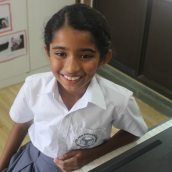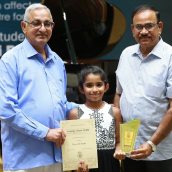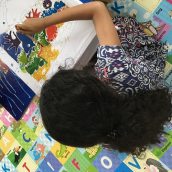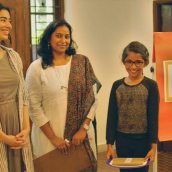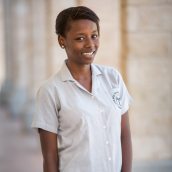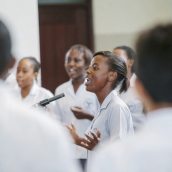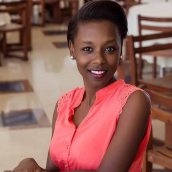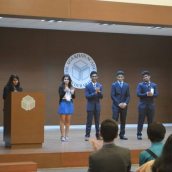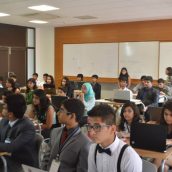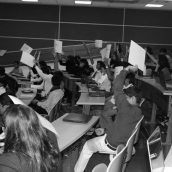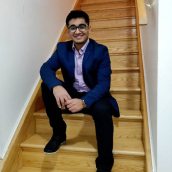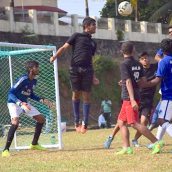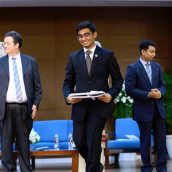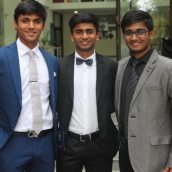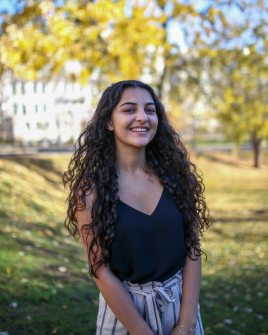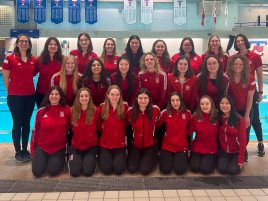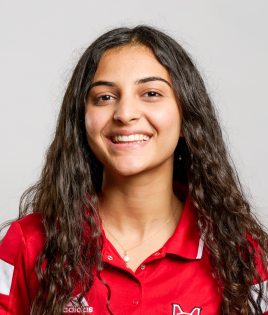Aanya Athota - Junior School's budding concert pianist
Mary Favour (Class of 2015): Ambitions to build a better future
For a while, getting an education was a process for Mary Favour. She would rise early in the dark – at 4:00 am – and make the long trek to school on foot with her three siblings, arriving at around 6:30 am each day. By the time they returned home to Mombasa, it was 7:00 pm. The rest of the evening was spent helping their mother around the house and finishing their homework.
It wasn’t easy, Mary recalled.
“My sisters and I grew up with a single mother,” she said. And resources were tight.
When the electricity bill wasn’t paid, the Favour children would study under the dim glow of a kerosene lamp or by candlelight. The four siblings had limited school supplies and relied on Mary for many of their study materials.
“We got awarded books if we topped the class,” she explained. “Sometimes we’d get textbooks, other times we’d get storybooks or novels. It was an incentive that the teachers had to motivate students.”
A new opportunity at the Aga Khan Academy Mombasa
Despite the obstacles, Mary said her mother was determined for her to succeed. She pooled her resources to give Mary a much-needed laptop in grade 9. By then, things had begun to turn around – Mary had received a full scholarship to study and live at the Aga Khan Academy Mombasa as part of its Talent Identification Programme, a programme that provides students from more disadvantaged backgrounds the opportunity to attend the Academy on full scholarship. She would graduate in 2015 and go on to study at the University of Toronto in Canada, also on full scholarship.
Now a second-year student at university, Mary hasn’t forgotten her difficult upbringing or her roots. In fact, the struggle to get an education early on has instilled in her a strong desire to give back to her community and help others like her get a shot at a better life.
“Six years of growth, skill and a good education” at the Academy was “a gift,” Mary said. “I want to [give] a gift to someone else.”
In particular, she’s learned the importance of independence, humility and sacrifice – lessons she put to use during her Academy days.
Mary joined the Aga Khan Academy in 2009 as part of the first batch of students in the Talent Identification Programme. While there, she participated in a range of activities, including choir, soccer and debate, with the same level of perseverance her mother had taught her. She quickly excelled academically, becoming an honors student in grade 10, and also challenged herself in extracurriculars – musically in competitions and as the assistant captain of her hockey team.
Helping others through community service
Beyond this, Mary fostered a passion for community service and activism rooted in her desire to help outsiders fit in. She led the ‘Just Say No’ initiative, a programme focused on rehabilitating primary school girls in Mombasa who had turned to prostitution in large part to support their families financially.
She worked with these girls for three years, exposing them to the same opportunities she and other students had the privilege of in their own education, including sports and debate. She hosted workshops on public speaking and art, as well as sessions with counsellors and strong female mentors, and invited the girls to perform at the Academy’s talent competition.
“The aim was to help them feel integrated into society but at the same time equip them with skills that would make their education holistic,” Mary said. The mission was especially important, she said, because of the gender gap she saw in Mombasa’s primary schools and the way in which this unfair system contributed to larger problems down the line.
“That inequality creates an imbalance that marginalizes women in our society,” Mary said.
Under her leadership, the club received three awards and became one of the most successful student groups on campus.
Supporting other students to succeed
In addition, Mary founded the ‘I Know Who I Am’ initiative, a programme that integrates scholarship students like herself into the Academy community while understanding that they needed to “stay in touch with home and not forget their society,” as Mary explained.
“I wanted to celebrate the diversity that came with these students but at the same time make sure that they don’t lose themselves,” she said. So she ran workshops on pluralism and open-mindedness, ate food and played games the students would recognise from home and “held discussions on what it meant to be part of a community but remain true to yourself.”
In the summer of 2017, Mary interned with the Students for International Development. The non-profit organisation was founded and is run by students. While there, she worked with the Orphan Sponsorship Programme as project manager for about two months. Mary and her team focused on the Simboyi Primary School in Vihiga, in the west of Kenya. They were in charge of the remedial education project for orphans and also worked on projects to support students financially.
After conducting interviews with some of the students in Vihiga, Mary and her team developed a means by which to help them be better equipped to reach their full potential. According to Mary, a number of the students came from families that were struggling to make ends meet. Some, she recalled, told her they only had one meal per day, which usually consisted of just ugali or porridge. Others said they didn’t eat at all. Further, a number of those who performed well in class were unable to pay for their exams and had to sit them out instead.
With Mary’s help, the organisation created a scholarship to help these students. The award, which she said covers basic health care, one meal a day, a yearly uniform and exam fees, will be able to assist 55 students during the current academic year at Simboyi. The hope is that the sponsorships will continue into the next year if budget and fundraising allow.
Real-time results and change like this mean the world for Mary, not least because she knows firsthand what it’s like to have the academic situation and resources not in your favour.
“I was a child with big dreams and no way of actualising them until I joined the Academy,“ she said. “I want to be for someone else what the Academy was to me.”
Catalyzing change for a better future
Mary believes education is one of the best tools to rid our societies of poverty, and she’s determined to be in a position to support students so they have better paths forward at their disposal than what she had. That’s why she plans on returning to Kenya after she’s obtained the necessary experience and skillset to properly give back to her country and community.
Currently majoring in human geography and diaspora and transnational studies and minoring in African studies, Mary thinks that, through the study of cultures and international development, she can better understand how to bridge the gap between rich and poor at home. Her hope is to protect the rich cultural diversity of Kenya but also contribute to changing the country so that it is better able to develop and sustain itself and compete and interact on a global scale more effectively.
“Kenya is at such a pivotal moment in the making of African history,” she said. “It has so much potential. I just want her to maximize her potential. I want to help her do it.”
Mary is uniquely positioned to kickstart such a change at home. Her pluralistic perspective on the world and passion for country could be just what Kenyans need to motivate their leaders to be better and to take action to institute real change. And if her triumphs at the Academy are any indication, Mary’s motivation may just be contagious.
By Farah Mohamed
AKAHMUN 2014 – The Future is Now
It all began on 22 August, 2014, when the Secretariat for the Aga Khan Academy, Hyderabad Model United Nations 2014 was finally announced. There was excitement in the air, as well as anxiety. We weren’t sure how we would raise the bar set last year. I was unsure of how the team would work together, how passionate they were and whether offsite management would work. I had organized the Model UN last year too, but this time, it was different. I wasn’t on campus and I didn’t know the new lot of students I was dealing with.
We began our journey with our first ever Model UN meeting. I expected the meeting to start late, for punctuality was rare to see. However, I got my first surprise, when every single member turned up not only on time, but half an hour early! That day I knew that no one would follow the timeline. Not because they’d miss the deadlines, but because their absolute dedication to AKAHMUN drove them to accomplish much more than what was required of them.
We planned out an extensive timeline of every aspect of the conference, a string of meetings and the nature of committees. Although everything looked perfect, I knew from experience that I must expect speed breakers, for if there are no problems, I know that I am surely doing something wrong.The first hurdle we encountered was in dealing with the day scholars. As part of the pre-Model UN preparation, we decided to organize trainings for the delegates. However, because this time around we had day scholars taking part too, we needed to ensure that we included them in every aspect of the conference. Arranging bus timings, coordinating with parents and taking permissions from teachers was a massive task. There were times when we wouldn’t be able to include the day scholars, when the timings wouldn’t match or when the day scholars had other programmes on schedule. However, we tried to reach out to as many as possible because it was a start, indeed. If it weren’t for my anchor, the Secretariat back on campus, it would have been impossible to organize such trainings.
The second hurdle we encountered was when we needed to finalise the committees. All the members of the Executive Board were excited about the idea of a Joint Crisis Committee (the Allied and Axis Cabinet), where the workings of one committee affect the workings of another. We had just one question in mind: would the first-time delegates be able to pull it off? The decision to go ahead with this committee was a risk, for crisis committees require a certain level of debate and experience. However, I also knew that with the Directors I had, I could trust that they would leave no stone unturned.
Logistics are by default the biggest area of concern in any conference, for it is by far the hardest job to pull off. The job entailed printing folders, placards, arranging the venue, the speakers, lights, cold drinks and much more. Last year, we didn’t have as many delegates to cater to, but this time around the number was massive. There was surely an inverse relationship between the number of days left for the conference and the number of challenges we faced. There were times when we were disheartened at a permission not going through or a delay in procurement of materials. Yet, it was the DP1 lot of the logistics team that stood strong. They travelled off campus, to far away locations, to get materials, send documents for printing and purchase eatables. I was truly surprised at the amount of effort they put in both during and after the conference. They worked during Diwali breaks and on weekends, like professionals, and never complained at having to do the most trivial tasks.Fast forward three months. It is 14 November 2014. After hours of tireless work, pushing ourselves to meet deadlines, and sleepless nights, it was D-Day. The air was filled with excitement and nervousness, as first-timers walked into committees, unaware of what to expect. And it wasn’t just the delegates, the Directors too were nervous, for most of them were taking the other side of the dais for the first time. Seeing the delegates buzzing through the committee rooms, we knew that the roller coaster ride had just begun. All we heard over the next three days were: Do we have projectors in all committees? Is the AC working? Are there enough chocolates in each committee? Where are the pens? Whether it be lunch, breakfast or dinner, we all forgot what it was to have a proper meal because our main focus was to get the delegates in committee.
All the efforts paid off when I received two unusual requests, over the three days of the conference. A member of the IT team, who had enrolled his name on the team to avoid participating in debate, came up to me and asked if he could participate in a committee. Initially, I was upset at this last minute request and so I asked him why he had made such a sudden request. What he replied then stayed with me throughout the conference. He told me that on seeing the enthusiasm amongst the delegates, he wanted to experience what it was like to be one. And so without any prior research, he sat through committee sessions and eventually won an award. This incident made me realize the potential at the Academy. It is only a matter of pushing them to apply themselves.
Another time, a 7th grader, who had entered the conference as a logistic member, came up to me and expressed his grief. On further probing, he told me that he really wanted to be a delegate, but couldn’t because he was a 7th grader. He had been so mesmerized by the whole event that he wished to take part. I smiled, with a sense of pride, at the impact of the conference. Over the next three days, the 7th grader debated issues in ECOSOC, argued with his seniors, and remained unintimidated by their age or knowledge.AKAHMUN 2014 had the power to bring about change. The JCC, which we were most skeptical about, brought out the best in delegates. The morning crisis, which initially made the students cranky, became the highlight of the three days. Students who initially didn’t openly accept the idea of a Model UN, jumped to take part. More importantly, though, I learnt, in the months leading up to the conference, the value of a great team. This team had dedication, passion and the will power, to make the impossible, possible. They were patient in low times, calm when faced with criticism and passionate about their goal. They worked day and night, at times when IB work was at its peak and applications lingering on their heads. They were truly the support system of this conference.
When I hear today how after the MUN, 7th grade students returned to their rooms, formed their own committees, elected their own Secretary General, came up with their own crisis and still use parliamentary language in daily conversation, I know that the Model UN tradition started in 2013, will continue for years to come. When I hear students asking about the next conference they can attend, I know that a spark has been ignited. When I hear that people are vying for the posts on the Secretariat next year, I know a culture has been sowed.
As we pass the baton on, we have realized the power of Model UN conference.
By Alisha Sonawalla
Ariq Kapadia (Class of 2017): Using creative planning to make an impact
My time at the Aga Khan Academy Hyderabad has been a wonderful journey for me. I went through series of experiences that has made me what I am today. My friends, teachers and everyone around me had an integral part in shaping my life. I joined the Academy back in 2012 and the residence experience was completely new for me. I was frightened by the fact that now I must live away from my parents at such an early stage. This could typically be a nightmare for some students, but for me it was incredible – reflecting on my time there only makes me want to go back and relive my life at the Academy residences. Getting up for school, all the students racing for the washrooms only to win the chance to take the bath first. Planning out sports schedule in lunch breaks just to play a good soccer game after school. All this has been fun and amazing, and it has taught us students a way of life.
The Aga Khan Academy Hyderabad has been well known for years for their participation and success in soccer. Being an integral part of this team was a joyous and proud experience for me. I was selected for the team back in 2013 – at that time, our team had just started their dominance in the city while we were still preparing ourselves for other challenges at school. It was tough at first to balance sports and academics alongside other projects and activities; however, we slowly got acquainted with it. We used to plan out training times before and after school and commit ourselves to the sport. It helped me improve my punctuality and taught me a lot about time management. Soon after, I had the privilege of leading my U-16 team to the finals on home soil; unfortunately, we ended as runners-up, but the experience I gained while leading had brought some significant change in my behavior. I had grown a sense of responsibility and maturity – I had learned to be a leader. It did bring us trophies back to back for the next few years, but the true realisation for success came in 2016 when we got an opportunity to challenge teams at the national level. It was the first time a squad of eight students were sent for the TAISI tournament to represent the Academy. It was foremost the proudest moment of my life, standing alongside my teammates, ready to take up some of the best teams in India. Successfully, we won the tournament and brought the trophy back home, the first-ever away trophy that the Aga Khan Academy Hyderabad has ever won. Achieving such feat has been overwhelming, but the values I have learned in this experience will remain within me and will shape my future.
Along with sports, I completed various projects at the Academy. As part of our IB [International Baccalaureate] requirement, we had to complete personal projects and Extended Essays in order to pursue our interest in researching about various things through variety of subjects under experienced supervision. Not only did these projects let us gain experience in detailed researching, but it also helped create awareness in specific regions. These projects were bounded with criteria, ranging from personal interest to benefits in society and impact on environment. It made us think about the different aspects and potential effects of our projects, and in turn adopt a broader approach to our research. My project was about city planning and making solar energy the primary source of energy. I aimed to create a small model that gives a better representation of my idea about proper city planning. It was my first time working with wires and solar cells. I had to learn to make a solar plant model and integrate it in the main model. It really was great fun, and I learned the importance of city planning to reduce space wastage and save energy by using alternate renewable sources of energy. My Extended Essay was based on my favorite topic: healthy food. I conducted chemical experiments on food to check the alteration of protein content in food when cooked or uncooked and when hot or cold. My aim was to understand the effect of temperature on food. It went well and it answered some questions I personally had as well. I used dangerous chemicals and chemical equipment throughout my Extended Essay. I improved my personal skills in areas such as communications and built confidence in my ability to work individually. I learned more about society and gained a variety of knowledge on environment preservation.
During my time at the Academy, I have developed skills and values from certain experiences, but it was my participation in Model United Nations (MUN) that had a significant effect on me. I started participating in MUN to enhance my verbal skills and improve my knowledge about events happening around me. Over a period, I swiftly transited to the logistics group. I realized that my ability to manage and plan were beneficial to these events. I was given a chance to assist the Under-Secretary-General of Logistics and soon after I claimed the title for myself. Through this experience, I improved my management skills, developed various approach to different problems and mastered problem-solving skills as a result. I was given the opportunity to lead the Academy’s first ever METROMUN Conference, which allowed students from various schools to participate. The challenge of managing other students was very beneficial to me as it has boosted my confidence in my management skills. Once I had experienced managing MUN, I sought more knowledge and experience in this area – this helped me get into a co-op programme where I am currently working on certain projects and managing project teams to get the best results.
Over the period of time I spent at the Academy, I applied a common skill to all the initiatives in which I took part: strategic planning and creativity. Whether it was sports, projects or MUN, I was fond of innovation and had always been busy with creating something with whatever I had around me. When we plan our strategies for a soccer game, I loved coming up with interesting formations which sometimes didn’t make much sense. I would never give up trying to find a better one, sometimes I would modify the existing one or would come up with something new. Similarly, in MUN, I would plan to change the setting or come up with a different style of conducting the conference. I always looked for alternatives for the existing ideas to make them better or search for a new one to improve efficiency. All these made me realise that engineering is what suits me well and my interest in aerospace and machines brought me to continue my studies in Mechatronics Engineering at the University of Waterloo. Henceforth, with such knowledge, I can pursue my dream of developing my home town and making India prosperous in terms of knowledge and technology and to help His Highness achieve his vision of eliminating poverty.
All this knowledge and these experiences have helped me get into the University of Waterloo. Studying at my dream university is a direct result of what I have accomplished through hard work, determination and focus. My friends and teachers at the Academy supported me throughout, and all the memories I have from there still teach me various things in life. The experience that I had in those five years at the Academy continues to develop me further and make me more capable of success. In my engagement with activities at the university, I have found that all the skills I learned at the Academy have prepared me to face the upcoming challenges.
When I look back to five years ago, I see a small kid, terrified and trying to surpass the ranks. However, now five years later, even though I am still trying to achieve my goals, I feel ambitious and determined, not scared but instead craving to prove myself. I have had a lot from the Academy and now I feel it is my time to give back to society to make this world a better place to live in.
By Ariq Kapadia
Muskaan Bhaidani (Class of 2020): Journey to university and the Academy's impact
Muskaan Bhaidani is an alumna of the Aga Khan Academy Mombasa who was in the Class of 2020. Graduating with an impressive International Baccalaureate (IB) Diploma Programme (DP) score of 44 out of 45, Muskaan is now attending McGill University in Montreal, Canada.
Read on to see what Muskaan says about university life and how her time at the Academy contributed to who she is today.
Can you please tell us about yourself, Muskaan?
I did the IB DP from 2018 to 2020 and took economics, geography and English at higher levels and mathematics, biology and French at standard levels. At the time, I took these subjects purely out of interest, and I really enjoyed what I did. However, I’ve always wanted to work in the development sector, so I think geography and economics played into that really well. I also did my extended essay in French since I wanted to improve in it, but now that I am studying in Quebec, it’s been really helpful.
How did you manage to narrow down your interests to zone in on a career path finally?
That’s such a big question to answer! Honestly, I still don’t think I know for sure what I want to do. I think that the path that I’ve chosen to take is just to keep going ahead with doing what I like, which right now is international development with a focus on food insecurity. In fact, I did my personal project at the Academy around food insecurity, and passion has definitely stuck with me over the years. I’ve also taken an interest in social entrepreneurship, which I could potentially see myself pursuing in the future. Right now, however, I’ll be going with the flow and figuring things out one step at a time.
How did you find the university application process? What did you find challenging, and how did you choose between all the universities you got into?
The university process is definitely difficult and scary because of the uncertainty it entails. I applied to the US, UK and Canada. I personally felt that applying to Canada was a much easier process since you don’t have to send in any standardised test scores or personal statements. Their supplementary requirements, if any, are very minimal compared to the UK and the US. And since a lot of Academies students end up coming here, it’s nice to know that you have an established system to fall back on if you need to. I think the main reason I got accepted to the universities I applied to was because of my academic performance and extracurricular activities that I took part in at the Academy which have carried me to university. As for how I decided on McGill in the end, it was mainly a lot of research and making pros and cons lists. I tried to compare universities in terms of the course I’ll be studying, what I want to do in the future, opportunities I would get while still studying, acceptance rate, etc., and McGill stood out to me in all these aspects. Montreal is a great city for students, and I am glad it worked out!
What have you done since you joined university that you are most passionate about?
I have been a part of multiple clubs. One, in particular, is IYAD (IRSAM Youth Advisory Delegation), a youth advisory delegation to the United Nations, where we write policies and present them at the UN Headquarters in New York every year, and it’s been something I’m really passionate about as I used to participate a lot in Model UN. I am now an executive in the club! I also took part in Enactus, a social entrepreneurship club where we mainly try to help local businesses thrive, and it has been a rewarding experience. Lastly, I am also a member of the varsity artistic swimming team – I used to do a lot of swimming at the Academy till COVID-19 happened, and this was the perfect way to get back into it in an artistic form I had never done before!
How has university life been? And how have you been preparing yourself for this upcoming exchange programme you are participating in?
Life at McGill differs a lot from person to person, but it mainly consists of class in the morning, followed by any extracurriculars you may have taken up. I also have a student job as a student advisor, so I have that in my routine as well, besides swimming and clubs. Going into your third or fourth year in university also means you have to cook for yourself and run your own household of sorts – this actually makes up a substantial portion of a student's schedule. I don't find it to be incredibly different from the high school experience, it’s just more diverse in terms of what you study within your specified subject. I will be going on an exchange to UCL in London next semester. Of course, I’m nervous, but I’m looking forward to immersing myself in a new culture since I’ll only be there for three months. I do consider Montreal home now that I’ve lived here for three years, and going away from home is daunting. I hope it feels as welcoming as Montreal. But from what I understand, London is very diverse, with lots of things to do, and I know I need to put myself out there and be open-minded.
How has the Academy helped shape you and prepare you for university?
The Academy has taught me how to put myself out there confidently by never limiting me and assuring me that I can do anything I set my heart to. It has a way of boosting your self-esteem and shows you your strengths and uniqueness. I engaged in a lot of communal activities and opportunities at the Academy, so I don’t find it difficult to do the same at university, whether that’s applying for a challenging course, position or an exchange programme.
How important do you think it is for students to reach out to Academies alumni?
I think it’s very important. We all leave school and make great friends at university, but the friends you make at the Academy are just different because it is so easy to spend time with them for hours and feel surrounded by a sense of community and warmth. In fact, my roommate now at McGill is a good friend of mine from the Academy. It is easier to reach out on an established Academies-centric network if and when you need help, especially because all of us who have been through the application process are always willing to help whenever we can. Having an alumni community only makes it more accessible and convenient to reach out.
Do you have any advice for students going through the university application process right now?
Work on your predicted grades, those are very important. Build good relationships with your teachers and they can direct you on how to constantly get better at your subjects. And, this might sound cliché, but be authentic in your applications. You never know what a university wants in its essays, and in a pool of incredibly smart and talented applicants, the only way to truly stand out is to be your unique self. So, focus on what you are interested in as opposed to what you think others might find interesting.
Interview conducted by DP2 student Samhitha Paruchuri from the Aga Khan Academy Hyderabad.
University visits calendar
Click the link below to view or download the calendar of university visits and fairs for 2018-19.
